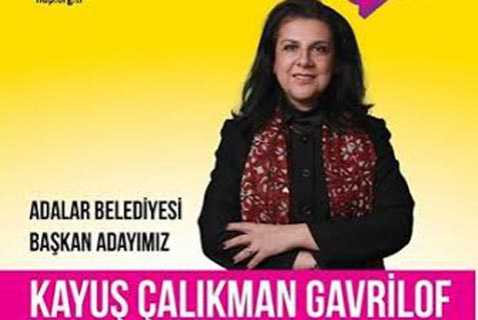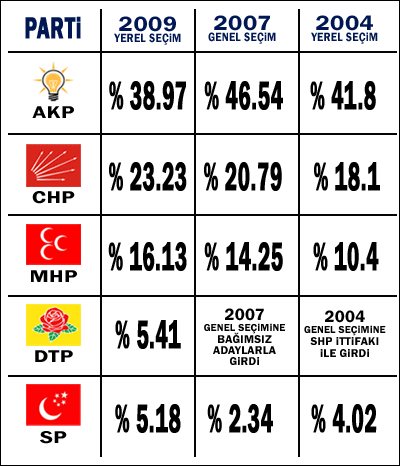Sako Arian

“I’ll win if Armenians back me,” she says. “But Armenians here are used to voting for their executioners”
Kayuş Çalıkman Gavrilof, an Armenian from Istanbul, has thrown her hat in the race for the mayor of the Prince Islands((Turkish: Prens Adaları); a chain of nine islands off the coast of her native city.
She’s running as a member of Turkey’s Peoples’ Democracy Party (Halkların Demokratik Partisi, HDP for short) in the March 30 Turkish local elections.
An admirer of the Armenian woman writer and social activist Zabel Yesayan, Kayuş says her chances of winning are good if the local Armenian community supports her. That support, however, is questionable, as she notes later in our conversation.
“With her drive, written word and essence, she [Yesayan] was a pivotal figure and it is in her footsteps that I walk today, with the hope that I do not meet with the same fate,” says Kayuş.
(Zabel Yesayan was accused of nationalism in the Stalinist purges. Arrested in 1937, the writer died of unknown circumstances in Siberia – S.A.)
Kayuş Çalıkman has translated Yesayan’s 1911 book Averagneru Mech (Among the Ruins) into Turkish. Recently published by Aras Publishers, the book tells of the tragic fate of the Armenians in Cilicia during the Adana massacres of 1909.
The would-be mayor says she first got involved in politics when she joined the Peace and Democracy Party (BDP), a pro-Kurdish party, in Turkey. The HDP is considered pro-minority and women’s rights and Kayuş says there are other Armenians running for seats from the party.
Q: Mrs. Çalıkman, will the HDP be contesting local elections throughout all of Turkey?
A: No. Other Kurdish organizations will be participating in elections in the eastern provinces, while the HDP will run candidates in the west.
Q: You are running for the post of mayor in Istanbul’s Prince Islands. Can you tell us about this municipality?
A: There are nine islands in the district of which six are inhabited. Two of them are private property. The ninth belongs to a cooperative union.
Q: Are there any Armenians living on the islands?
A: Yes. At one time, one of them [Kınalıada], was called the Armenian Island. We have a church there and until recently, a school. The Armenian presence was much stronger in years gone by. Sadly, the island has lost its Armenian reputation today.
Q: Who are you competing against in the election?
A: I’m up against candidates from the two major Turkish parties; the AKP (Justice and Development Party) Party and the CHP (Republican People’s Party). I think you know that the AKP is Prime Minister Erdoğan’s party.
Q: And the CHP is the party of the Kemalists?
A: Yes, but in fact, deep down, the CHP doesn’t know what it actually represents. It’s the oldest political party in Turkey founded by Ataturk.
Q: Which of them is your strongest competition?
A: The Kemalist party doesn’t stand for much and I can say that it’s pretty weak. As for the other, it’s quite strong and can present problems for me. Nevertheless, I should add that my chances of winning are good.
Q: Why do you say so?
A: To be honest, I’ll win if the Armenians there vote for me.
Q: They’ll surely vote for you, right?
A: No, you’re mistaken. Unfortunately, the reports I’ve received say that most Armenians will vote for the candidate of Erdoğan’s party.
Q: Why?
A: Because Armenians are used to giving their votes to their executioners. (A moment of silence)
You know, I have travelled to many Armenian communities, and if you want to know the truth, the Armenians of Istanbul underwent grave pressures in the recent past and continue to experience such a state today. This is the result of policies crafted by the state.
Q: But haven’t visible changes occurred in recent years in Istanbul and turkey as a whole?
A: I should say that the Istanbul Armenian community experienced a shock in recent years, especially after the killing of Hrant [Dink]. I think you know the rest of the story. Hidden Armenians began to search for their identity and return to their roots. And those living in the ghetto started to leave their closed quarters. Sadly, however, the process of opening up took the wrong path. This opening up wasn’t political but had more to do with the sexes.
Q: Could you clarify what you mean?
A: Today, mixed marriages between Armenians and Turks comprise a large percentage in the community. It seems that many Armenians were waiting for this chance to make such a choice. Before, mixed marriages were much less. Today, they have reached 80%. Don’t get me wrong, but it’s as if Hrant’s murder was wrongly understood and that after he died people felt freer to marry Turks.
Q: What was the reaction of Istanbul Armenians to your candidacy?
A: Honestly, it’s still too easy to say.
Q: Will you have meetings with Istanbul-Armenians as part of the campaign?
A: I haven’t planned anything yet. To date, I’ve only met with members of the Sepastia Compatriotic Union. It was quite fruitful.
Q: Getting back to the elections, what are the aims of your party, the HDP? You said there were other Armenian candidates as well.
A: Yes, there are. There are some ten Armenians running for the HDP in various Istanbul districts. We have an important candidate running in the Şişli district and another in Bakırköy. I should note that some will be running for seats as members in municipal councils as well.
Q: And what about Armenian candidates in the other parties?
A: I know that there are two candidates in the CHP, but their chances of winning are slim.
Q: Any concluding thoughts?
A: I would ask that in future Istanbul is also considered a part of the diaspora.
Q: But, as you know, many Armenians are insulted when Istanbul is seen as the diaspora.
A: Let them be insulted. That’s their problem. The fact is that Istanbul isn’t our homeland. All of us, or at least the vast majority, have roots in western Armenia. This is the simple fact. Today, Istanbul is just another diaspora colony. Everyone should accept this reality.
The land of our birth is the provinces, western Armenia. In my case, even though my ancestors came to Istanbul in the distant past, I still regard the city as a colony.
Photos: Kayuş Çalıkman Gavrilof’s Facebook page


